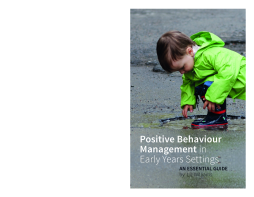
Additional Information
Book Details
Abstract
Drawing on her extensive practical experience, Liz Williams provides a highly accessible and much-needed guide to promoting positive behaviour in early years settings.
In this book, she explains why children may act in the way that they do and how behaviour should be understood differently in children of different ages. She demonstrates that social and emotional capacities differ greatly in these crucial development years and how this impacts on the support needed at each stage. The book considers a host of factors influencing positive behaviour, such as environments and the importance of planning, and looks beyond the child to show the vital role that staff and parents have in promoting appropriate behaviour.
Written in clear and understandable language, this book is full of ideas that early years workers can easily implement in their day-to-day work.
This reflective book on positive behaviour management in Early Years' settings explores how to support children effectively with their personal, social and emotional development. There is also a chapter on self-regulation, which is particularly useful for giving children in their Early Years not only the tools to regulate their own behaviour but also the vocabulary to describe their emotions and actions
Laura Henry, Early Years Specialist
Liz Williams is an experienced consultant with excellent knowledge of special educational needs and disabilities (SEND), supporting social, emotional and behavioural needs, nurturing practices, SEND in schools and behaviour systems. She has vast experience of training, supporting, assessment and systems level work in schools and has a range of multi-agency experience. She lives in North West England. For more about Liz, visit www.lizwilliamsconsultancy.co.uk.
This book provides a helpful and accessible introduction to providing the conditions in which children's social skills can positively develop. Offering some basic guidance, hints and tips the author introduces the importance of observation, self- reflection and positive response to challenging situations.
Karen Graham, Rossett Training Ltd
An invaluable straight forward practical guide to support practitioners working in early years settings based on a wealth of experience of what makes a difference.
Sue Graham, Nursery Director, Locking Stumps Nursery
An easy to read book with strategies that support early years setting to promote a positive approach to behaviour. A quick read (great for time poor earlier years practitioners) and something you can dip back in and out of as you need to
Jennie Johnson MBE, Chief Executive, Kids Allowed Limited
Table of Contents
| Section Title | Page | Action | Price |
|---|---|---|---|
| Positive Behaviour Management in Early Years Settings – An Essential Guide by Liz Williams | 3 | ||
| Acknowledgements | 6 | ||
| Introduction | 9 | ||
| 1. Definitions of Behaviour | 11 | ||
| 2. Why We and Children Behave as We Do | 15 | ||
| 3. Why Two-Year-Olds May Behave Differently to Three- and Four-Year-Olds | 21 | ||
| 4. Teaching Self-Regulation | 25 | ||
| 5. What We Mean by Nurture | 29 | ||
| 6. The Importance of Physical Environments and Their Impact on Behaviour | 33 | ||
| 7. The Importance of Expectations and Teaching Positive Behaviour | 39 | ||
| 8. Focussing on Primary Behaviours | 45 | ||
| 9. Rights, Rules and Relationships | 47 | ||
| 10. Observing Behaviour Within a Setting | 53 | ||
| 11. Antecedents, Behaviour and Consequences | 59 | ||
| 12. The Importance of Having a Plan When It All Goes Wrong | 65 | ||
| 13. Staff Feelings | 67 | ||
| 14. Building Trust with Children and Parents | 69 | ||
| 15. Ten Very Important Things to Remember | 73 | ||
| Index | 75 |
